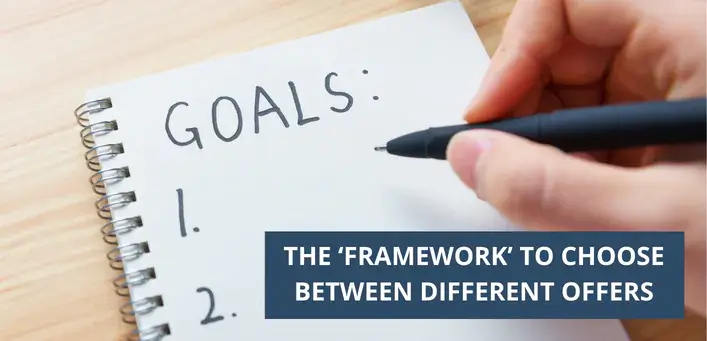"How can I decide between multiple job offers?", "Which top consulting firm is the right one for me?" These are questions that probably everyone will come across at some point in their career. Finding the right position, career and company is not easy and most people will have to switch positions and companies more than once before ending up in a place where they feel fulfilled. In this article you will get career advices, by case coach Robert, that will help you to decide between job offers and how to make the right decision.


Deciding Between Job Offers


First of all, congratulations on being in a situation to choose between multiple job offers – you must have performed very well during your interviews to secure even multiple job offers at once! Although this situation is not uncommon, it is not that common either – different firms have slightly different criteria to look for. Often one candidate resonates more with one and less with another firm, apart from the interview ‘logistics’ so that you have two (or more) final round interviews in a short period of time so that you actually have multiple valid offers at hand at a certain point in time.
Although it’s definitely a great situation to have multiple job offers to choose from, it’s still a bothersome situation. High achievers typically do not want to leave anything up to chance, and especially after having worked so hard to be in this very situation, it’s absolutely appropriate to have a very clear and conscious decision-making process in place to make the best decision possible.
At the same time, be aware that barely anything will be perfect in life. Regardless of which company option you finally go, there will be up and downs and potential situations in which you think you might have taken the wrong decision (the grass always looks greener on the other side). From a slightly philosophical angle, the most crucial point is to make a conscious decision, representing the best decision you could have taken, given your specific situation and the information at hand. Certainly, you need to do your homework and collect any relevant information which is realistic to obtain. You need to think about future scenarios of yourself and your career – but you can’t predict the future (after all, who would have thought in 2019 that international travel would come to a complete stop for a while and that only a few years later there will be a force invading a European country?). So do your homework to feel comfortable enough to make a conscious decision which you can defend against yourself afterward, so you will never want to look backward and blame yourself after making a decision in your life.


One assumption for the following text: there is no clear, obvious winner between the offers you have at hand – at least for you personally and subjectively. Very often, my coaching candidates face the issue of choosing between McKinsey vs. BCG – similar firms and career perspectives, definitely not a clear-cut choice. However, even MBB vs. a certain low-brand boutique consulting firm might not always be an obvious choice – in the end, it must fit you subjectively and not ‘objectively’ for an anonymous person.
Typically, after having received multiple job offers, my coaching candidates push me immediately to provide a list of decision criteria to choose between the offers. But: first, we must look at the process and carry out the necessary steps to come to a conscious decision. The process is fairly simple indeed but contains one initial, crucial process step, which puts some more work on the candidate's side. Without that, everything which follows is virtually meaningless, so you absolutely positively need to invest time and effort into it. Having said that, let’s look at the ‘framework’ to choose between different offers:
2.1 Be Clear About Your Short-term (1-2 Years), Medium-term (3-5 Years) and Long-term (5+ Years) Goals
Before it even makes sense to look at specific factors to compare your job offers at, you must first have an absolutely clear perspective of your goals. In other words, if you don’t have any clear goals, each way is a good one for you. And there is no such thing as an ‘objective’ best choice – it always must fit to your goals for a job search.
Typically, this won’t happen overnight, and usually not even within a few days. For many career candidates it needs quite a bit of time to think and reflect upon such overarching topics in life – for the near and more distant future.
Based on experience with thousands of candidates coached over way more than a decade, I found many graduate candidates in such a situation. Until graduation, life is often clearly structured and progressing, without a need to make difficult decisions with high uncertainty and incomplete information (at least not in the greater scheme of things). During this time, most candidates focus on their studies they chose a while ago (might have been sometimes quite deliberately, other times more because they didn’t know clearly back then what their goals were and what they really would enjoy doing after graduation … but that’s a discussion for another day), and sometimes entering into their first more serious romantic relationships (might sometimes be quite deliberately, but other times more so because it ‘simply happened’ that way).
Most of the time, all this goes quite well without a need to have clear goals in mind (please note that I am not criticizing this, it’s only about giving you my somewhat objective observations!). Therefore upon graduation, when fully entering an adult life in which you need to make decisions and bear (and live) all related consequences, that’s quite a new situation for many candidates and thus needs time to get the required clarity.
When thinking about your goals, please bear in mind that at least in the medium to long run, you need to align your professional goals with your personal goals – even more so when planning to work in a highly demanding industry like consulting. Simple example: if you want to start a family with several children, take care of and see them yourself each night, and spend family-only-time during weekends while your girlfriend/wife absolutely positively wants to enjoy her professional career, this won’t work out with working in the consulting industry (exceptions may occur, but most definitely not a scenario with a high likelihood of success). Long story short: When thinking about your goals over different periods of time, make sure you combine both professional and personal goals for a solid decision at the end!
Once you are clear yourself about your goals now and in the future, it’s time to derive the ideal and best job offer from your goals. That will serve you well as a benchmark to compare your options at hand in the subsequent process step. Now, let’s look at key criteria to decide between different job offers – some of those won’t discriminate between your specific offers at hand and you might ignore them completely to reduce the complexity of your final decision; others will give you a clear picture of what is the better fit for you and your individual situation:
2.2.1 Firm Culture and People
You will spend a lot (really a lot!) of time together with your colleagues. Especially while travelling you spend virtually all your wake time from breakfast, working day including lunch, dinner and often also sports activities with people from your firm (and more so in highly pressurized projects in which you remain on-site over weekends – happening not that often but still happening occasionally…). Ideally you had a chance to get to know several persons from different ranks of the firm not only during the interviews, but in a more relaxed atmosphere to get a solid impression if you’d enjoy spending time with those folks or not, maybe even within one of their office locations get feel the vibe. Typically, this factor is underestimated by many candidates – even if it’s only for a few months, working with people you don’t like is a horrible experience, not speaking about a several years tenure at the firm which you’d normally want to have on your CV as a minimum before pursuing other activities, for the sake of demonstrating consistency and stamina in your CV. Most definitely this will have a strong impact on your overall job satisfaction, and as an implicit consequence also on your career trajectory in this firm. At the end, as analytical you want to be on this – it’s more like a gut feeling if you feel comfortable with those folks or not, so simply listen to your gut in this respect.
2.2.2 Professional and Personal Growth
Have a close look at which opportunities you will have for your professional and personal growth at the firm. This includes obvious elements like formal training (often with world-class experts on those subjects) as well as formalized mentorship programs with senior people of the firm. On top of that, often less obvious, many informal training opportunities occur throughout each working day, especially when collaborating closely with senior staff (depending on how project teams are structured for a specific engagement, there might be more or less opportunities for close collaboration with senior staff, so you might want to probe into that during your discussions with various firms).
2.2.3 Entry Rank and Career Progression
While the entry ranks will be mostly similar across firms for graduate hires, professional experience might be viewed from different angles and leading to a different entry rank in different firms. So your starting position could be already different depending on how your previous work experience (if any) is factored in, easily saving you 1-2 years to reach a certain career level.
One word of caution: it’s comparably easy for any consulting firm to fast-track your career progression and promote you earlier than the official timeline suggests, but it’s very difficult to keep an underperformer longer on the same position (and close to impossible to ‘downgrade’ him). For that, even if a higher entry rank might be a purely positive aspect from the first glance, it could easily backfire and destroy your career in this firm if you are not up to the performance standards of that level.
2.2.4 Compensation
You’ll often read that your salary should not be the primary decision factor to choose your firm, however I completely understand that particularly early in your career you finally want to start making a good income after a long period of investing time, effort and money into your education – especially if you might have accumulated debt like student loans during that time. While I agree that it should not be the primary factor of your decision, it might be more or less important for you specifically, given your overall financial situation.
2.2.5 Other Perks
When speaking about other perks, the leading consulting firms are quite generous, up to sponsoring your full MBA or post-doc education at the world’s leading schools. Aside from education, there might be many other perks like company cars, mobility budgets and many others you’d want to investigate.
2.2.6 Office Locations and Project Focus
Specific offices often have a specific industry focus – if you want to work in the financial services industry, Houston (Texas) or Detroit (Michigan) will not be the best fit for you. While consultants are still known for having a heavy travel schedule, the Covid pandemic as well as environmental concerns seem to have consulting travel reduced quite a bit also for the future, especially true for more junior ranks in the firm. Contrary to that, remote work got more and more acceptable (if not even asked for) by clients during previous years, so your specific office location would have mattered less – but for the time being we are getting back to the normal again, so I would not speculate on the remote work argument too much in the future, especially since this might be a significant influencing factor for your career development.
Even though you might not spend that much time in the city of your office location (depending on your travel schedule), you should also factor in if you feel comfortable with living in this city from purely practical purposes at least for a few years – starting from the climate over recreational activities to your personal network.
In case you are interested in living in different countries or have personal interests in another specific country, more offices of a firm are of course a plus and gives you more flexibility to change in the medium term (although a permanent change of office is possible only for top performers in the firm – so it won’t simply happen but you’d need to fight for it). Also, chances for international projects are higher if there are many international office locations.
2.2.7 Brand Recognition, Exit Opportunities/Alumni Network
Brand recognition, exit opportunities and alumni network are bound together. The stronger the brand recognition (think MBB vs. tier-2 or tier-3 firms), the better your exit opportunities will be. On top of that, many firms have a dedicated alumni network (whereas McKinsey is said to having the strongest one, which is not that surprising looking at how many c-levels and public service officers (and sometimes even start-up founders) have a McKinsey background) which will help you a lot to find new opportunities once the decision is taken that you will leave the firm.
Once you went through steps 2.1 and 2.2, it’s finally time to evaluate your options. While the technicality is secondary (you might want to use a simple bullet point pro/con list or a develop a weighted scoring model, factoring in or not your subjective gut feeling at the end), the important aspect is having a clear connection between your goals and the ideal job offer criteria, and a clear perspective on how each of your offers performs for each relevant factor. Having this in place will make the final decision indeed surprisingly simple!
3. About the Author
McKinsey offers w/o final round interviews - 100% risk-free - 10+ years MBB coaching experience - Multiple book author
- Professional Experience: Solutions Factory Consulting GmbH, Consulting Case Interviews, Mayr-Melnhof Group, McKinsey & Company
- Languages: English, German
- Location: Austria (UTC +2)
With his many years of experience at MBB, Robert is the perfect coach for precisely these job interviews. As a multiple book author, he imparts the right knowledge and helped many candidates to succeed in consulting interviews and secures MBB and Tier-2 job offers. The feedback of candidates ensures satisfaction. On PrepLounge he has a consistent 5.0-star ranking and attained certified awards over several years. Thousand of upvotes guarantee in-depth knowledge.
Continue to Learn









